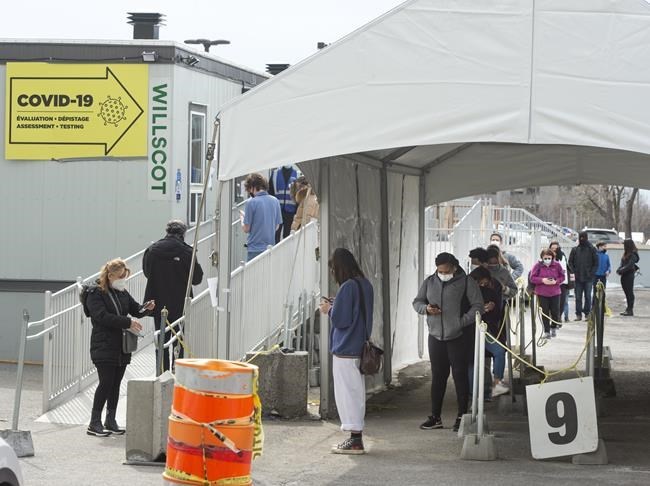Canada soared past its one millionth diagnosis of COVID-19 on Saturday, reaching the grim milestone the same day it administered its six millionth dose of vaccine to protect against the virus.
British Columbia pushed the nation over the threshold on Saturday afternoon when it reported 2,090 infections over the course of two days, bringing the national number to roughly 1,001,650.
Canada has been recording about 100,000 new cases every three to four weeks, surging past the 900,000 mark on March 13.
The nation had also administered six million doses of vaccine as of Saturday evening, provincial data show. The federal government had set that number as the goal for how many vaccine doses should arrive in Canada by the end of the first quarter of 2021 -- a target it met last week.
The two milestones are emblematic of where the nation stands with COVID-19, ramping up its vaccination drive as more contagious variants of the virus fuel the pandemic's third wave.
Alberta, for instance, is investigating what the province's chief medical officer of health described as a "significant" outbreak of the P. 1 variant of concern, which first emerged in Brazil.
Dr. Deena Hinshaw said in a tweet that the outbreak can be traced back to a returning traveller.
"Health officials are working hard to limit future spread and reaching out directly to those at risk of exposure," she said. "AHS will ensure that anyone at risk is isolated, offered testing twice and connected with supports if needed."
Hinshaw said officials will provide an update on the investigation on Monday.
That province logged an estimated 1,100 new cases of COVID-19 Saturday, roughly half of which are variants of concern.
Hinshaw said 35 per cent of the province's active COVID-19 cases are due to those variants, which are more contagious and can cause more serious illness.
Some provinces have introduced stricter public health measures in a bid to contain the spread of such variants, with Ontario entering a "shutdown" on Saturday.
The new restrictions force gyms and personal care services across the province to close, but allow essential and non-essential retailers to remain open, with their capacities limited to 50 per cent and 25 per cent respectively.
Schools in the province will also remain open for in-person learning following the delayed spring break, which ends on April 9.
Classrooms were shuttered throughout the province after the winter break in January and gradually reopened based on the local prevalence of COVID-19. The boards in hardest-hit hot spots opened classrooms in mid-February.
But the province has said it doesn't want to take that step again, calling it disastrous for children's mental health.
Ontario recorded 3,009 new infections on Saturday and 3,089 a day earlier, when the government didn't share data because of the Good Friday holiday.
Quebec, meanwhile, has seen daily cases back up over the 1,000 mark in the last few days after weeks of logging new infection rates in the triple digits, recording 1,282 cases on Saturday.
And B.C., whose high numbers tipped Canada over the edge of one million, broke its own record two days in a row, reporting 1,072 diagnoses on Saturday and 1,018 on Friday.
The province's chief medical officer, Dr. Bonnie Henry, and Health Minister Adrian Dix said people should stay in their own community or health authority while vacationing and consider limiting their travel to day trips or overnight stays in a local campground or hotel.
"We have seen too many cases of people travelling outside their health authority region and not using their layers of protection, leading to outbreaks and clusters in their home community," they said in a written statement.
"These outbreaks are avoidable, and right now we must stay within our local region for the safety of your community and for others."
Saskatchewan, meanwhile, counted 280 new cases on Saturday and Manitoba reported 181 over two days.
Farther east, New Brunswick recorded nine new cases and Nova Scotia counted four.
This report by The Canadian Press was first published April 3, 2021.
Nicole Thompson, The Canadian Press




